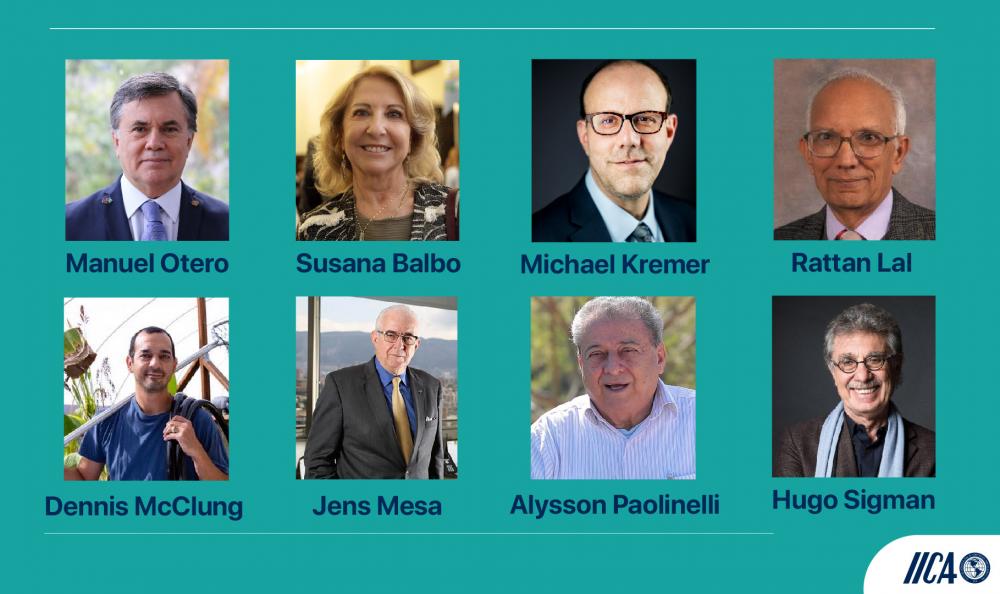IICA Director General and Goodwill Ambassadors emphasize the role of agriculture in driving sustainable development

San Jose, 16 September 2020 (IICA) – In a discussion that brought together scientists and entrepreneurs, the Goodwill Ambassadors and Director General of the Inter-American Institute for Cooperation on Agriculture (IICA) stressed the key role of agricultural activity in sustainable development, food security, social inclusion, the creation of opportunities and the interaction with science and technology.
Manuel Otero, Director General of IICA, invited the Institute’s Goodwill Ambassadors to participate in a discussion that underscored the essential contribution of agriculture and the importance of its environmental, technological, economic, social and human development dimensions, while emphasizing its potential to drive post-pandemic recovery.
All the IICA Goodwill Ambassadors participated in the discussion: Michael Kremer, 2019 Nobel Prize winner in Economics and Professor at the University Chicago; Rattan Lal, the 2020 World Food Prize Laureate; Alysson Paolinelli, former Minister of Agriculture of Brazil; prominent business leaders Susana Balbo, Jens Mesa and Hugo Sigman, as well as Dennis McClung, Director of an NGO involved in the creation of educational strategies linked to sustainable methods of food production.
In the discussion, Otero remarked that, “This dramatic period is also a fitting moment to once again look to rural territories as areas of opportunity and social progress, which will call for appropriate institutional structures, a new generation of public policies for family farming and the facilitation of access to digital technologies, to allow all our farmers to increase their output and boost their income”.
Kremer lauded IICA for its promotion of digital approaches in agriculture, which is something that the outstanding U.S. economist considers vital for the advancement of small-scale farmers.
He pointed out that, “The rural population faces many barriers, such as credit, market access and behavioral barriers. A series of approaches to attempt to assist in overcoming these barriers should be taken, through the use digital agricultural extension services; and IICA understands this vision”.
“It is very exciting to see the work that the Institute is doing in this area, which is the use of digital approaches in agriculture”, he said. “IICA has a long and historic tradition of creating opportunities for family farmers in Latin America and the Caribbean and yet it is also at the forefront of the most modern technologies”.
Hugo Sigman, Argentinian doctor, psychiatrist and founder of Grupo Insud, emphasized that, “We as agricultural producers must work assiduously to train rural workers, giving them a decent job, a good salary and an education that will allow them to aspire to better jobs and upward social mobility, which is so necessary in our societies.
Rattan Lal, winner of the 2020 World Food Prize, co-laureate of the Nobel Peace Prize and a professor at Ohio State University, stressed the need for increased productivity to be linked to environmental protection. He stated that, “Rural producers are the greatest stewards and stakeholders in the sustainable management of natural resources. Small improvements in farming can make a major difference not only for food security, but also for the quality of the environment, the soil, water and air”.
Amidst this appeal for the intensive use of technology, the efficient use of natural resources and the recognition of the value of agriculture, an essential point emerged: the importance of women’s participation in agriculture and the acknowledgement of women as community leaders. “We must strongly advocate for rural women to access health systems, a better education and training”, said Susana Balbo, businesswoman and Argentina’s first female enologist. “And tomorrow, rural women should have the opportunity to receive a pension and the social assistance to which they are entitled. Rural women should have the opportunity to offer value added in their work”.
Jens Mensa, Executive President of the National Federation of Oil Palm Growers (FEDEPALMA) of Colombia, stressed the importance of building a grand business coalition to position agriculture at the heart of the public agenda.
“Those of us in the rural sector, the institutions and entrepreneurs, will have to launch a crusade, a campaign, to ensure that agricultural interests are included among the top priorities of the public agendas of our countries”. Another area of focus was safety and international trade. “Each country needs to be equipped with a traceability system that is reliable and must ensure that when food reaches the table of consumers, they can be confident that the food that they are eating is safe”, stressed Allyson Paolinelli, former Minister of Agriculture of Brazil.
On the other hand, according to Dennis McClung, Founder, President and CEO of Garden Pool, a non-profit organization involved in research and the generation of educational strategies linked to sustainable methods of food production, the simple act of adopting special techniques can change the lives of those working in agriculture in regions that are vulnerable to climate change.
“Once people begin to produce their own food, this may also encourage entrepreneurship. More importantly, once they have acquired these skills, these people will be ready to tackle the next climate catastrophe with a greater sense of resilience”, he said.
Otero agreed with the Ambassadors, defining agriculture as a “essential lever for development”, pointing out that this “gives a particular importance to Latin American countries in the global context”, given the region’s unparalleled wealth of natural resources.
“Let us celebrate and recognize the value of agriculture”, he said. “It is an activity that, in the modern context, can create opportunities more than any other. It is, therefore, as it was thousands of years ago, our surest passport to a better future.
The discussion may be accessed at the following link: https://youtu.be/4_AuL2QDemw
More information:
Institutional Communication Division
comunicacion.institucional@iica.int